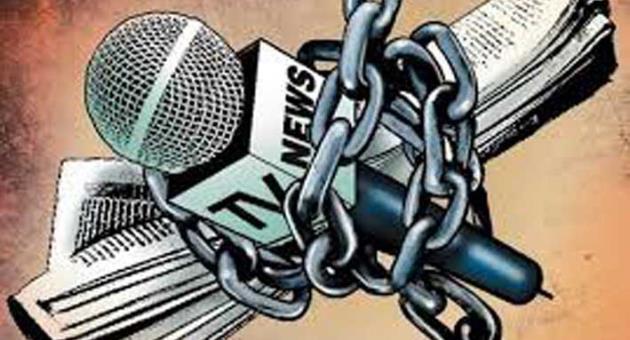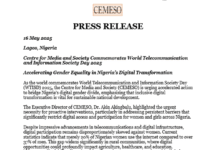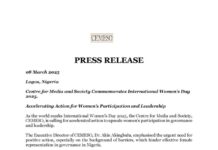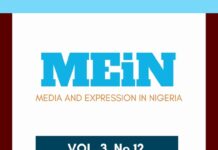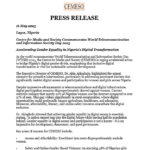By Adewale Kupoluyi
DEMOCRACY requires an active media to thrive. This is because the parameters that constitute good governance, which is a common feature of a vibrant civil rule, can be measured by the level of accountability, transparency and rule of law that exist in a country.
Ordinarily, it is a difficult task for many governments to appraise itself for good or bad. Hence, the importance of the media in serving as the prism to review the performance of democratic governance. An attempt to stifle the media in carrying out these functions would bring about dire consequences for good governance. Senate A case under contention is the Nigerian Press Council Amendment Bill, which has already been debated at the public hearing stage.
The bill seeks to regulate journalism practice by creating a statutory body to arbitrate between the media and the public. It is on this premise that the media can be compromised, that Nigerians are angered with the new media bill before the National Assembly and have described it as retrogressive, unconstitutional and anti-people. The main justification that promoters of the legislation are hinged on is that today, proliferation of the media is so severe that fake news and hate speech have dominated public spheres and pose national security problems.
We daily read false stories, recycled information and outright falsehood, mostly in the social media which could trigger violence, enmity and hatred among the people. Ordinarily, any responsible government should be bothered about the flow of information, fostered under an atmosphere of peace, sanity and tranquility. This is more important now that the general elections are fast approaching. The media should, therefore, not be a weapon for creating chaos, disaffection and intimidation in the land.
Logical, is this line of argument. Beyond this thought, the introduction of the anti-media bill at this time is not only curious but apprehensive. It is suggestive of a deliberate plan to manipulate the media towards certain political advantage. It is also instructive to say that the action is sub judice since a suit on the subject-matter is still pending before the Supreme Court, which questions the rationale behind why the bill should have been drafted in the first instance. The lawmakers should have awaited the outcome of the court’s ruling without acting in contempt of the court.
It is because of this constitutional crisis that many people feel that the introduction of the bill is nothing, but a mere amalgamation of the obnoxious Public Officers Protection Against False Accusation Decree No. 4 of 1984 and Newspapers Registration Decree 43 of 1993, being brought back into our legal system through the back-door; the draconian laws that were promulgated during the totalitarian military rule in the country. It’s existence would criminalise journalism practice in Nigeria. Do we need this? The answer is ‘no’. Already, there are several extant laws in the country that can tame the excesses of media practitioners.
The birth of the imposed bill would make the Nigeria Press Council, NPC; a Federal Government agency, to usurp the powers of the courts by assuming extra-judicial powers in the course of carrying out its statutory duties. In addition, the bill is inconsistent with the provisions of Sections 22, 39 of the 1999 Nigerian Constitution (as amended) and Article 9 of the African Charter on Human and Peoples’ Rights (Ratification and Enforcement Act) No. 2 of 1983 to which Nigeria is a signatory and is also part of the country’s laws.
That the bill, through some of its other obnoxious provisions, intends to indoctrinate Nigerians, through the use and misuse of educational curricula in the training of journalists and usurp the powers of the regulatory bodies in the educational sector that are equipped and designed to teach courses in media and journalism such as the National Universities Commission, NUC, and the National Board for Technical Education, NBTE, that regulate the teaching and research in the fields of journalism, mass communication and similar courses in the universities, polytechnics, monotechnics and colleges of technology. This is unnecessary and a misplaced priority. Nigeria should do this rightly. We should not take after countries that are not getting it right in democratic practice and press freedom.
The United States of America, Great Britain, France and Canada can be said to be doing well in terms of free press. But many African and developing countries still lag behind in creating room for media independence. Recently, the Egyptian parliament approved during a final reading, similar obnoxious bill that would allow government authorities to monitor social media users in the name of combatting ‘fake news’.
Under the new law, people whose social media accounts have more than 5,000 followers are to be placed under the supervision of Egypt’s Supreme Council for Media Regulations. The bill, which had been backed by two thirds of the Egyptian parliament, would require the assent of President Abdel Fattah el-Sisi, before being ratified into law. This unwarranted censorship would encompass websites, blogs and personal accounts in Egypt.
The council (similar to the NPC), would be authorised to suspend or block any personal account that publishes or broadcasts fake news, or anything inciting that violates the law, or creates violence or hatred. Article 29 of the bill states that journalists should be jailed pending trial, if found guilty of inciting violence or hatred or discrimination through their writings. Imprisonment before trial! Many journalists are currently behind bars in Egypt.
Social media platforms such as Twitter and Facebook have become one of the last forums for public debate in Egypt since the 2013 ban on all gatherings without police approval. Over 500 websites have allegedly been either blocked or closed down while those who administer the websites have faced jail time or made to pay heavy fines. We recall that Nigerians are more active in protecting the nation’s democracy at all cost.
A similar and controversial bill failed to sail through the parliament in 2016, when the Frivolous Petitions Prohibition Bill (also known as the Social Media Bill) was being pushed for passage into law before it ‘died’ at the Senate plenary. The bill was dropped during the celebration of the International Technology Day, an event that offered an opportunity for users of the Internet and service providers to examine the impact of the social media on good governance. This is likely to be the same path the new legislation is bound to take going by criticisms that had trailed its incursion into our political lexicon.


